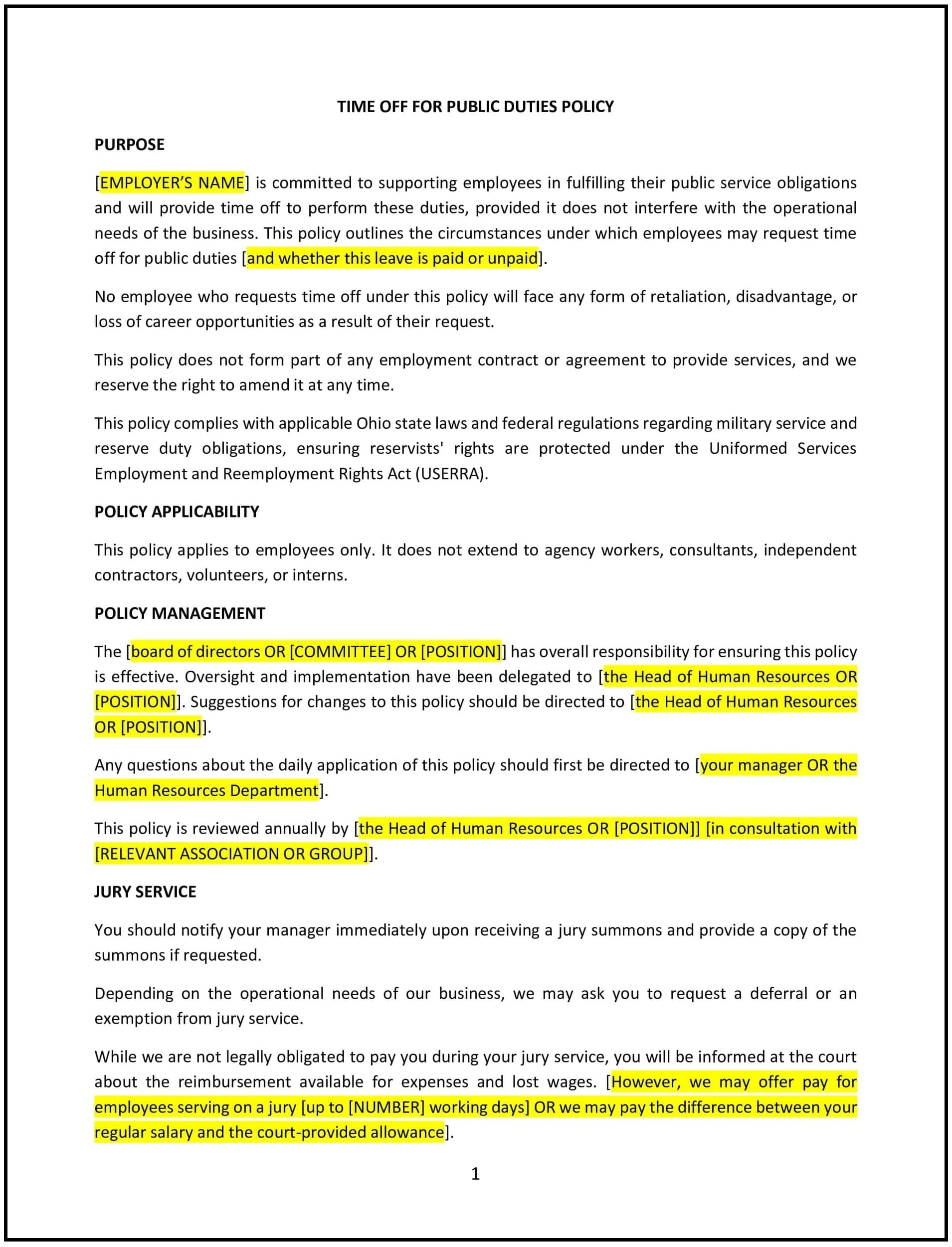Time off for public duties policy (Ohio): Free template
Got contracts to review? While you're here for policies, let Cobrief make contract review effortless—start your free review now.

Customize this template for free
Time off for public duties policy (Ohio)
A time off for public duties policy outlines the guidelines for providing employees in Ohio with time off to perform public duties, such as serving on a jury, participating in government meetings, or engaging in community service activities. This policy ensures that employees are able to fulfill their civic responsibilities while maintaining their employment status and compensation. It defines the types of public duties covered, the process for requesting time off, and the business's obligations regarding employee leave for these purposes.
By implementing this policy, Ohio businesses can support employees' civic duties, promote a sense of responsibility, and comply with legal requirements for public duty leave.
How to use this time off for public duties policy (Ohio)
- Define public duties: The policy should specify which public duties are eligible for leave, including jury duty, court appearances, voting, or participation in local government meetings. It should also address any additional civic duties that may qualify for leave under Ohio law.
- Outline the request process: The policy should specify the process employees must follow to request time off for public duties, including advance notice requirements, any necessary documentation (such as a jury summons), and who to contact for approval.
- Set guidelines for compensation: The policy should clarify whether employees will receive paid or unpaid leave for public duties, or if compensation will be based on the specific public duty involved. For example, some businesses may choose to compensate employees for jury duty while others may not.
- Specify leave duration: The policy should outline the maximum amount of time off employees are entitled to for public duties, based on the type of duty and Ohio state laws.
- Address job protection: The policy should ensure that employees are protected from job loss or retaliation while taking time off for public duties. It should clarify that employees will return to their same or equivalent role after completing their civic responsibilities.
- Provide for documentation: The policy should specify any documentation that employees must provide to verify their participation in public duties, such as jury summons, court orders, or official letters from government bodies.
- Review and update regularly: The policy should be reviewed periodically to ensure it is aligned with Ohio state laws, federal regulations, and any changes to public duty leave requirements.
Benefits of using this time off for public duties policy (Ohio)
This policy provides several key benefits for Ohio businesses:
- Promotes civic responsibility: By offering time off for public duties, the policy encourages employees to fulfill their civic obligations without worrying about losing income or their job.
- Enhances employee engagement: Supporting employees in fulfilling public duties can enhance their sense of purpose, engagement, and loyalty to the business.
- Reduces workplace disruption: Clear guidelines for public duty leave help prevent confusion or delays related to employees taking time off for these duties, ensuring smooth business operations.
- Supports employee well-being: Allowing employees to take time off for public duties can reduce stress related to balancing civic obligations and work responsibilities, contributing to better overall well-being.
- Complies with legal requirements: The policy ensures that businesses comply with Ohio state laws regarding public duty leave and employee rights, reducing the risk of legal issues related to leave entitlements.
- Improves company reputation: Offering time off for public duties demonstrates the business's commitment to supporting employees' roles in the community, which can enhance its reputation as a socially responsible employer.
- Strengthens trust and morale: Employees are more likely to feel valued and respected by the business when they are given the opportunity to serve their community without fear of negative consequences at work.
Tips for using this time off for public duties policy (Ohio)
- Communicate the policy clearly: Ensure that all employees are aware of the time off for public duties policy by including it in the employee handbook, reviewing it during onboarding, and providing periodic reminders about how to request leave for public duties.
- Document requests: Employees should submit a formal request for time off with the necessary documentation, such as a jury summons or proof of attendance at a government meeting, to ensure proper recordkeeping and adherence to the policy.
- Apply the policy consistently: The policy should be enforced fairly and consistently for all employees, ensuring that no one is treated differently based on the type of public duty they are performing or their role within the company.
- Monitor and track leave: Keep track of public duty leave taken by employees to ensure that it aligns with the business’s policies and that employees return to work promptly after completing their civic duties.
- Offer support and flexibility: Be flexible with employees' schedules when possible, particularly for those with public duties that may require extended or unpredictable time off. This shows that the business values employees' community involvement and is willing to accommodate their civic responsibilities.
- Review the policy periodically: Regularly review the policy to ensure it is in line with Ohio state laws, federal regulations, and evolving business needs. Update it as needed to reflect changes in public duty leave requirements.